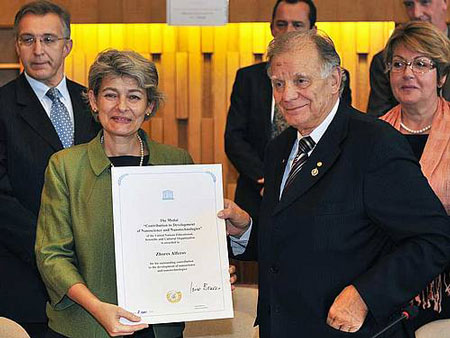| Posted: Nov 04, 2010 |
|
First UNESCO medals for nanotechnology go to Russian and Chinese scientists
|
|
(Nanowerk News) The first UNESCO Medals "For contributions to the development of nanoscience and nanotechnologies" were awarded on November 2, at Paris headquarters to two laureates: Russian Academician Zhores Ivanovich Alferov, winner of the 2000 Nobel Prize in Physics; and Chunli Bai, Professor of Chemistry at the Laboratory of Molecular Nanostructure and Nanotechnology in Beijing and Executive Vice-President of the Chinese Academy of Sciences.
|
 |
| Irina Bokova and Zhores Alferov.
|
|
In her address at the award ceremony, the Director-General of UNESCO, Irina Bokova, hailed "two world-class scientists whose work has taken forward our understanding of nature and its power." Professor Alferov received the first medal in person; Professor Chunli Bai was represented by Shuyun Shi, Ambassador and Permanent Delegate of the People's Republic of China to UNESCO.
|
|
"This award is recognition of the tremendous benefits of progress in the fields of nanoscience and nanotechnologies on our societies, our economies and on all of us," continued Ms Bokova. "UNESCO is committed to supporting the development of this new knowledge base for its potential in assisting countries and societies, including and especially developing countries."
|
|
Eleonora Mitrofanova, Chairperson of UNESCO's Executive Board, introduced the two laureates. Among their achievements, Professor Bai is the inventor of sophisticated nano-research tools including the ultra-high-vacuum scanning tunnelling microscope and Professor Alferov developed the "ideal" semiconductor infrastructure that forms the basis of all microelectronic devices used today.
|
|
The Medal was established at the initiative of the International Commission responsible for developing the Nanoscience and Nanotechnologies theme for the Encyclopedia of Life Support Systems (EOLSS) published by UNESCO and EOLSS Publishers. This initiative was supported by the Russian Federation's Permanent Delegation to UNESCO. The EOLSS constitutes one of the world's biggest web-based archives as a trans-disciplinary science base for sustainable development.
|

